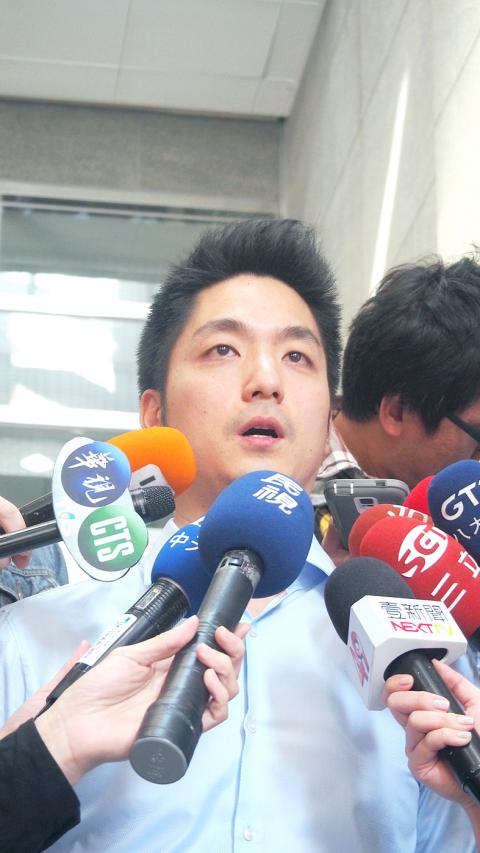Chiang Wan-an (蔣萬安), the son of former Chinese Nationalist Party (KMT) vice chairman John Chiang (蔣孝嚴) and a fourth-generation descendant of former president Chiang Kai-shek (蔣介石), on Sunday announced that he would run in the KMT’s legislative primary in Taipei’s Zhongshan (中山) and Songshan (松山) districts, pitting himself against incumbent KMT Legislator Lo Shu-lei (羅淑蕾) and KMT Taipei City Councilor Wang Hung-wei (王鴻薇).
Chiang Wan-an’s bid for the candidacy has been described by pundits as an attempt to avenge his father’s defeat at the hands of Lo in a 2011 KMT legislative primary.
Chiang Wan-an, 37, rejected the accusation, saying that there was no animosity between his family and Lo.

Photo: Tsai Ya-hua, Taipei Times
The nation has changed since the Sunflower movement and the nine-in-one elections last year, and young people need to step forward and bolster the KMT after the party suffered its greatest defeat in last year’s elections, Chiang Wan-an said.
Chiang Wan-an, who holds a law degree from the University of Pennsylvania, has been working as a lawyer in the US and is a partner in a Taiwanese law firm. He said that he does not have dual citizenship when reporters asked him about his nationality.
Meanwhile, the KMT’s Taipei branch said competition for the party’s legislative candidacy in Neihu (內湖) and Nangang (南港) districts is heated, with eight aspirants joining the primary after incumbent KMT Legislator Alex Tsai (蔡正元) announced that he would not seek re-election.
Among the eight aspirants are former KMT legislator Chiu Yi (邱毅) and former Mainland Affairs Council deputy minister Chang Hsien-yao (張顯耀).
The party’s regulations state that where there is only one registered candidate in a constituency, the candidate would be automatically nominated for the next year’s legislative elections, but if more than two contenders vie with an incumbent lawmaker for the party’s nomination, the incumbent has to pass an assessment, win a poll by a 5 percent margin and be approved by a nomination panel to secure the candidacy.
The nomination mechanism has been criticized by KMT Taipei City Councilor Lee Ching-yuan (李慶元) as lacking transparency, saying that the party is biased toward incumbents, and that it has not yet expounded on the methodology used in the assessment and poll.
“Should not incumbent legislators be held accountable [for the KMT’s rout in last year’s nine-in-one elections]? Will the public be satisfied when it sees the same old faces running the legislature again?” Lee said.
Lee said he declined to sign up for the primary as a protest against the party’s policy.
The list of members wishing to take part in the primaries was submitted to KMT headquarters yesterday, the Taipei branch said.

A preclearance service to facilitate entry for people traveling to select airports in Japan would be available from Thursday next week to Feb. 25 at Taiwan Taoyuan International Airport, Taoyuan International Airport Corp (TIAC) said on Tuesday. The service was first made available to Taiwanese travelers throughout the winter vacation of 2024 and during the Lunar New Year holiday. In addition to flights to the Japanese cities of Hakodate, Asahikawa, Akita, Sendai, Niigata, Okayama, Takamatsu, Kumamoto and Kagoshima, the service would be available to travelers to Kobe and Oita. The service can be accessed by passengers of 15 flight routes operated by

Alain Robert, known as the "French Spider-Man," praised Alex Honnold as exceptionally well-prepared after the US climber completed a free solo ascent of Taipei 101 yesterday. Robert said Honnold's ascent of the 508m-tall skyscraper in just more than one-and-a-half hours without using safety ropes or equipment was a remarkable achievement. "This is my life," he said in an interview conducted in French, adding that he liked the feeling of being "on the edge of danger." The 63-year-old Frenchman climbed Taipei 101 using ropes in December 2004, taking about four hours to reach the top. On a one-to-10 scale of difficulty, Robert said Taipei 101

MORE FALL: An investigation into one of Xi’s key cronies, part of a broader ‘anti-corruption’ drive, indicates that he might have a deep distrust in the military, an expert said China’s latest military purge underscores systemic risks in its shift from collective leadership to sole rule under Chinese President Xi Jinping (習近平), and could disrupt its chain of command and military capabilities, a national security official said yesterday. If decisionmaking within the Chinese Communist Party has become “irrational” under one-man rule, the Taiwan Strait and the regional situation must be approached with extreme caution, given unforeseen risks, they added. The anonymous official made the remarks as China’s Central Military Commission Vice Chairman Zhang Youxia (張又俠) and Joint Staff Department Chief of Staff Liu Zhenli (劉振立) were reportedly being investigated for suspected “serious

Taiwanese and US defense groups are collaborating to introduce deployable, semi-autonomous manufacturing systems for drones and components in a boost to the nation’s supply chain resilience. Taiwan’s G-Tech Optroelectronics Corp subsidiary GTOC and the US’ Aerkomm Inc on Friday announced an agreement with fellow US-based Firestorm Lab to adopt the latter’s xCell, a technology featuring 3D printers fitted in 6.1m container units. The systems enable aerial platforms and parts to be produced in high volumes from dispersed nodes capable of rapid redeployment, to minimize the risk of enemy strikes and to meet field requirements, they said. Firestorm chief technology officer Ian Muceus said